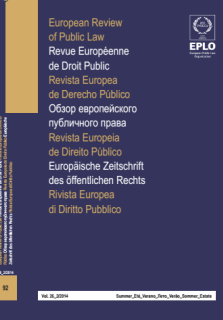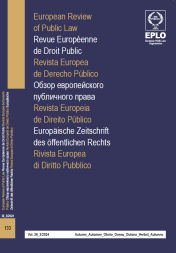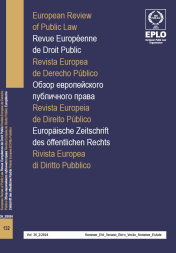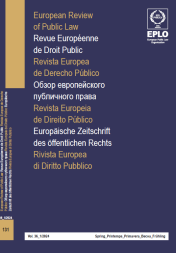
Editorial
ERPL, vol. 26, no 1, spring 2014 (91)
In this issue, are published the proceedings of the annual Conference of the EGPL organised from the 13th to the 15th of September 2013, on the subject "Public Law and Solidarity". Many prominent law scholars and legal personalities from all over Europe and the world participated in this Conference and contributed to the dialogue on the theme.
Under the heading "General Introduction: Solidarity, A Political Issue", first a paper considers solidarity as a political challenge and refers to both internal and international solidarity; it concludes that in these times of crisis, mainly for the peripheral countries of Europe, the feelings of solidarity and responsibility have to be enhanced. Under this same heading, a second paper after brief remarks on the legal, political and constitutional relevance of the concept of solidarity, focuses on social protection and the redistribution of resources. The final remarks of this paper are devoted to the dynamics of solidarity policies and to the role of the European Union.
Another heading is dealing with the theme of Solidarity as a Legal Concept. The first paper under this heading maintains that the legal concept of solidarity brings into play the responsibility of public authorities towards society and presents the multi-faceted function granted to it by the Lisbon Treary and the new model proposed by the Charter of Fundamental Rights, which however carries within it its own limits. The second paper under this heading maintains that solidarity could become one of the key issues of public action and of law in the field of biological human resources. It then goes on to examine how the State tries to regulate private solidarity in order to avoid the exploitation of people, by also developing an authentic public policy of sharing of resources, by focusing mainly on the French example.
Under the heading "Solidarity between Nations", a paper examines the question of whether solidarity is a legal principle in the relations among nations by first distinguishing between the different meanings of the word "solidarity" in public law, sociology and moral discourse and then by focusing on a crucial problem: the definition of the appropriate shere of solidarity. The next paper under the same heading addresses the question of "What does solidarity exactly mean in international law?" by first focusing on the solidarity both as a value, in its constitutional dimension, and as a principle, in its administrative dimension, second by examining the ambiguous relationship between solidarity and sovereignty and finally by outlining the key role of solidarity in the global legal space.
National reports follow this heading, coming from Bulgaria, Denmark, Germany, Italy, Latvia, Lithuania, Poland, Portugal, Serbia, Slovakia, and Spain. The authors of the national reports based their contributions either on a general questionnaire on "Public Law and Solidarity" or on a specific questionnaire on "Law and Solidarity between Riparian States" depending on the capacities of their countries. Both questionnaires are included in this ERPL issue.
A Case Study is then applying the concept of solidarity in an interdisciplinary manner within the international legal community. The dynamic character of solidarity is best illustrated within the two international law regimes, namely human rights law and international watercourses law, in the context of which solidarity is examined.
The Conclusions identify the eight focus areas of the conference: the great interest regarding the topic (Solidarity and Public Law); its paradoxical character (solidarity conceived as a remedy to the crisis, but crisis of solidarity); the variety of the ideological foundations of solidarity; its different forms; solidarity between who?; the legally operating nature of the concept; can solidarity be global?; and finally, is solidarity good or bad?. The Conclusions end with an optimistic note: solidarity is generally positive.
SUMMARY / SOMMAIRE
FOREWORD / AVANT-PROPOS
GENERAL INTRODUCTION: SOLIDARITY, A POLITICAL ISSUE / INTRODUCTION GENERALE: LA SOLIDARITÉ, UN ENJEU POLITIQUE
J. MIRANDA, Solidarity, a Political Challenge [IN FRENCH]
B.G. MATTARELLA, Solidarity, a Political Issue [IN ENGLISH]
SOLIDARITY, A LEGAL CONCEPT / LA SOLIDARITÉ, UN CONCEPT JURIDIQUE
F. PERALDI LENEUF, Solidarity, a Legal Concept? Study of the Concept in the Charter of Fundamental Rights of the European Union [IN FRENCH]
X. BIOY, Solidarity and Bioethics [IN FRENCH]
SOLIDARITY BETWEEN NATIONS / LA SOLIDARITÉ ENTRE LES NATIONS
L.M. DÍEZ-PICAZO, Solidarity Between Nations [IN FRENCH]
L. CASINI, Solidarity between States in the Global Legal Space [IN ENGLISH]
ELEMENTS OF COMPARISON / ÉLÉMENTS DE COMPARAISON*
R. STEFANOV, Public Law and Solidarity: Bulgaria [IN ENGLISH]
S. BØNSING, Public Law and Solidarity: Denmark [IN ENGLISH]
S. LORENZMEIER, Public Law and Solidarity in Germany [IN ENGLISH]
E. MORLINO, Public Law and Solidarity: Italy [IN ENGLISH]
B. SUDAVIČIUS, Public Law and Solidarity: Republic of Lithuania [IN ENGLISH]
G. KUCA / J. KARP, Public Law and Solidarity: Poland [IN ENGLISH]
V. FREITAS DA COSTA, Public Law and Solidarity: Portugal [IN ENGLISH]
J. JERINIĆ, How the Legal Principle of Solidarity is Reflected in Serbian Legislation and Policy [IN ENGLISH]
Ľ. MALÍKOVÁ / M. PATAKYOVÁ / K. ŠTEVOVE / D. ČIČKÁNOVÁ, Public Law and Solidarity - The Slovak Case [IN ENGLISH]
N. CAICEDO / D. MOYA, Spain amid the Economic Crisis: The Solidarity Principle at Stake [IN ENGLISH]
ANNEX I, Questionnaire - Public Law and Solidarity [IN ENGLISH]
ANNEX II, Questionnaire - Law and Solidarity between Riparian States [IN ENGLISH]
CASE STUDY / ÉTUDE DE CAS
V.M. TZATZAKI, Solidarity and Law: Examples Drawn by the International Community - Case Study [IN ENGLISH]
GENERAL CONCLUSIONS / CONCLUSIONS GÉNÉRALES
J.-P. COSTA, Public Law and Solidarity: Conclusions [IN FRENCH]






















